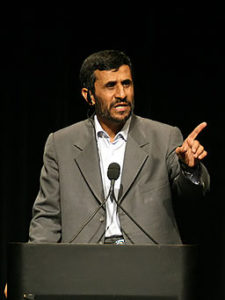 Dear Rabbi Zalman,
Dear Rabbi Zalman,
Since Israel’s inception, it has had its fair share of global critics. Jewish solidarity has always been crucial, but I feel that it has never been more important than now. Ever since the Islamic revolution of Khomeini, the Israel-Iran relationship has at best been strained, and for the most part downright hostile. With Ahmadinejad upping the rhetoric about Iran obtaining nuclear capability, coupled with his venomous determination to annihilate the “Zionist regime” the imminent threat to Israel’s security and safety is obvious. The fact that Israel is such a focal talking point in the political arena, especially in the upcoming Presidential election only underscores this point. What can I, a proud American Jew, do to help Israel? I already am committed to financially strengthening Israeli charities to the best of my ability, but there has to be something more that I can do.
Ben Ami
Dear Ben,
Firstly, G-d bless you for your concern for, commitment to, and solidarity with Israel and the Jewish people. Secondly, always remember, “the Guardian of Israel neither sleeps nor slumbers.” But you are nonetheless absolutely correct, there certainly is more that you (and all of us, in fact) can do to help our brethren during these crucial times.
In a few weeks time most congregations will be reading the weekly Torah portion of Vayishlach in which we find our forefather Jacob bracing himself for a fateful encounter with his brother Esau. Jacob is rather uncertain how this meeting will turn out, and to this end adopts a diverse three-pronged approach of preparation:
1. Jacob sent gifts to his brother in an attempt to appease him.
2. He readied himself for war.
3. He prayed.
In his hour of need Jacob did not make the error of relying either solely on his faith in G-d or his own strength. Rather, he complemented his trust is G-d with his own self-reliance. He did not see the solution as entirely physical (“realistic”), or entirely spiritual (“hopeful”) — pitting the two extremes against each other as if they were mutually exclusive. Jacob was a spiritual man living in a physical world, and he approached both of those realities with equal levelheadedness
So how can we take Jacob’s thought process and apply it to our own desire to help Israel?
1. Prepare for war
Physically: You can hop on the next El Al plane to Tel Aviv and enlist in the IDF. (Shout out to Minnesota’s very own “lone soldier” who has recently enlisted in the IDF. You make us proud, Jordan!)
Spiritually: If the above is not feasible, for one reason or another, then you may want consider becoming a spiritual warrior. Kabbalah teaches that within each and every one of us rages a fierce inner battle between two “kings” — one good, one evil — each vying for complete dominance of the “hill” that is our bodies. Embrace the struggle and fight the battle with integrity, with gusto, and with joy. Self conquest is humanity’s truest measure of strength.
2. Gifts/Appeasement
Physically: Continue to support Israel and all other worthy causes. It doesn’t get simpler than that.
Spiritually: Don’t let all the adrenaline-filled talk about becoming a warrior make you lose sight of the true goal. You gotta be able to tell the forest from the trees. The ultimate goal is peace and harmony, so go ahead and become a peace maker. Both within ourselves (the “mini” world), and across the whole planet (the “big” world). Think global, act local. Increase in Ahavat Yisrael, love towards your fellow Man, and if you have a little extra time, try to pacify the enemy within. Kill ’em with love, ya know!
3. Pray
If by now you are not thoroughly confused by all this talk of making war while making peace, I have the perfect finishing touch to this paradoxical conundrum. Combine the two! According to the Zohar, “Prayer is a time of battle.” Go figure.
Physically: You know what they say: If you talk to G-d, that’s normal. But if G-d talks back, then you need your head checked out… But seriously, talk to G-d. Like, have a conversation. Make it simple, real and pure. Like you would to a parent, or a friend; ultimately, prayer is essentially a relationship.
Spiritually: If prayer is about creating and nurturing a bond, then, by extension, the idea of prayer can be extended to any increase in Torah and Mitzvot that we add to our lives. In this particular instance I suggest the following two Mitzvot:
1. Tefillin: The Talmud (Brachot 6a) explains the verse “And all the nations of the world will see that the Name of G-d is upon you and they will fear you” (Deuteronomy 28:10), as referring to the Tefillin, because the Tefillin bear the letter Shin symbolizing G-d’s name. Seems pretty apropos to me.
2. Lighting Shabbat candles: At a time when the forces of darkness pollute our beautiful world with hatred and death, there can be no better response and counter-attack than the proliferation of light and warmth in the world. I can think of nothing which brings more peace, warmth, light and harmony to the world than that Shabbat candles.
We need no greater demonstration of the potency of one tiny action than nuclear energy. With the press of a button Hiroshima and Nagasaki were razed to the ground in a torrent of atomic rain. Imagine how much greater, infinitely greater, are the powers of good. Never underestimate the power of one deed. It’s called Atomic Goodness. Go ahead, unleash the power.
Rabbi A. J. Heschel once said: “All it takes is one person… and another… and another… and another… to start a movement”. Rabbi Zalman says: All it takes is one act of goodness and kindness…and another…and another…and another…to change the world.
(Photos: wikimedia commons)



